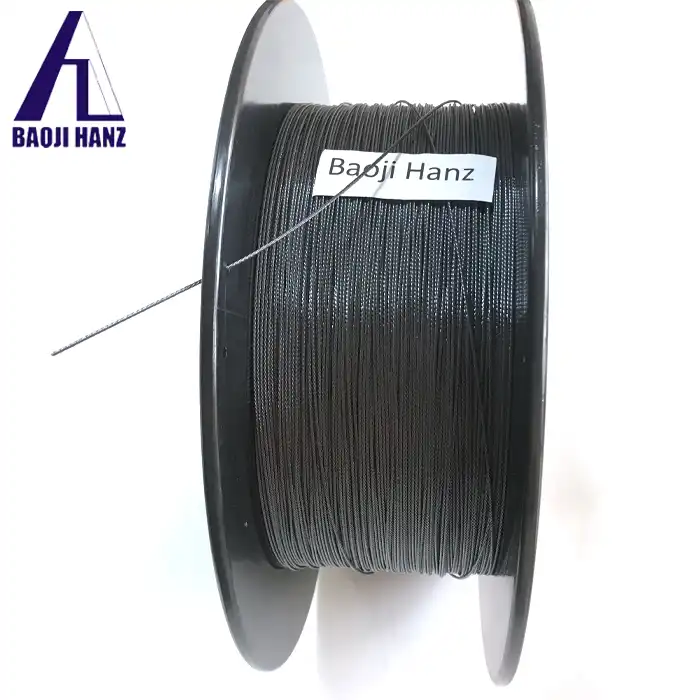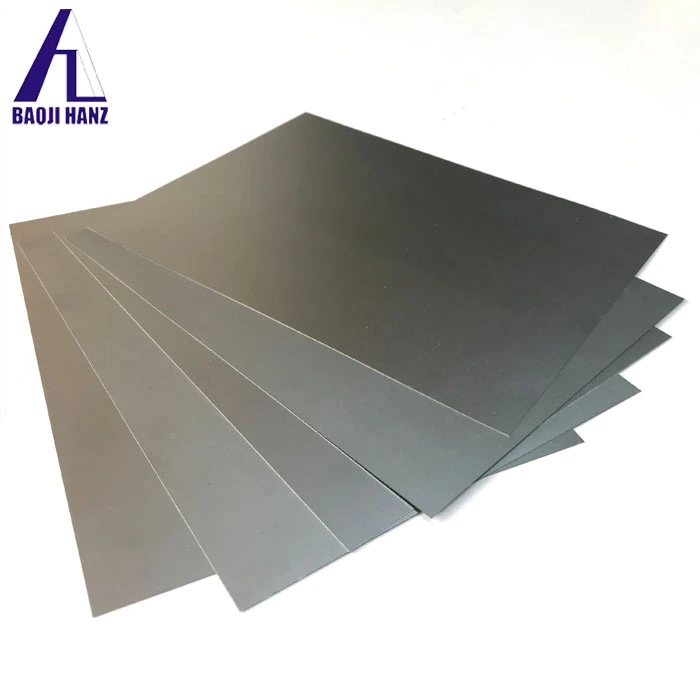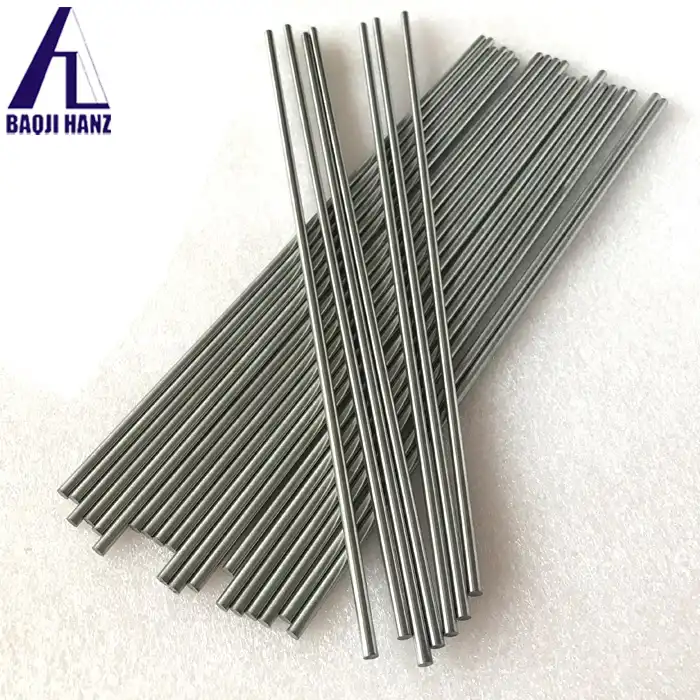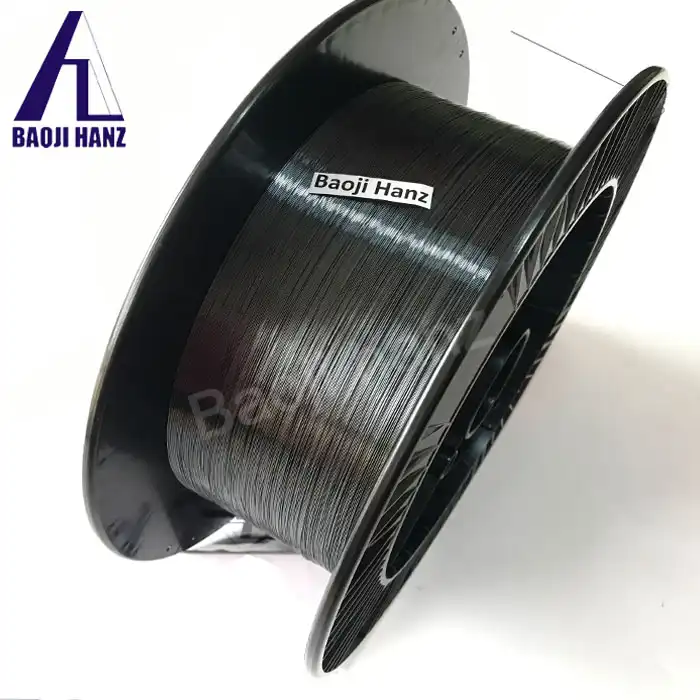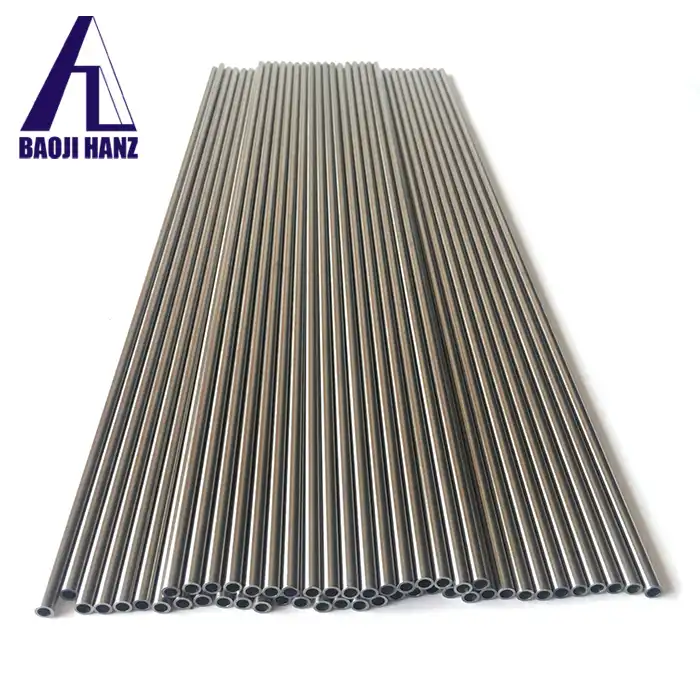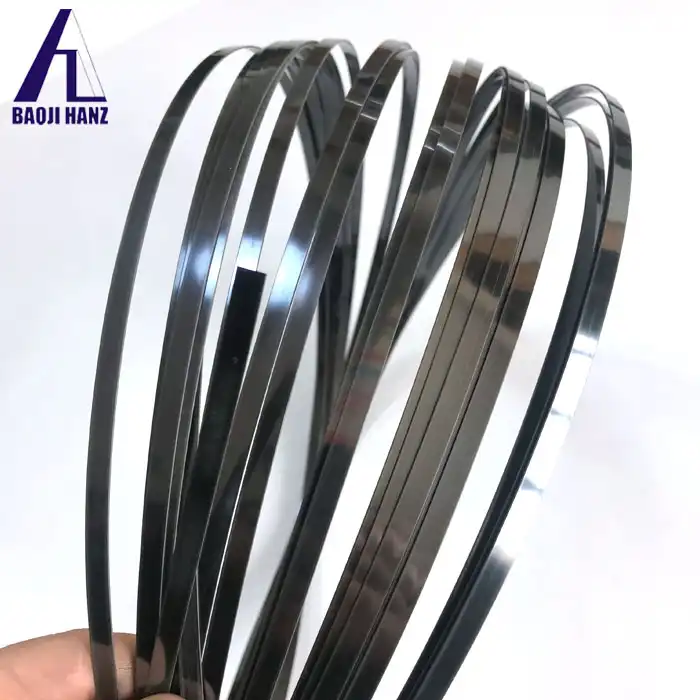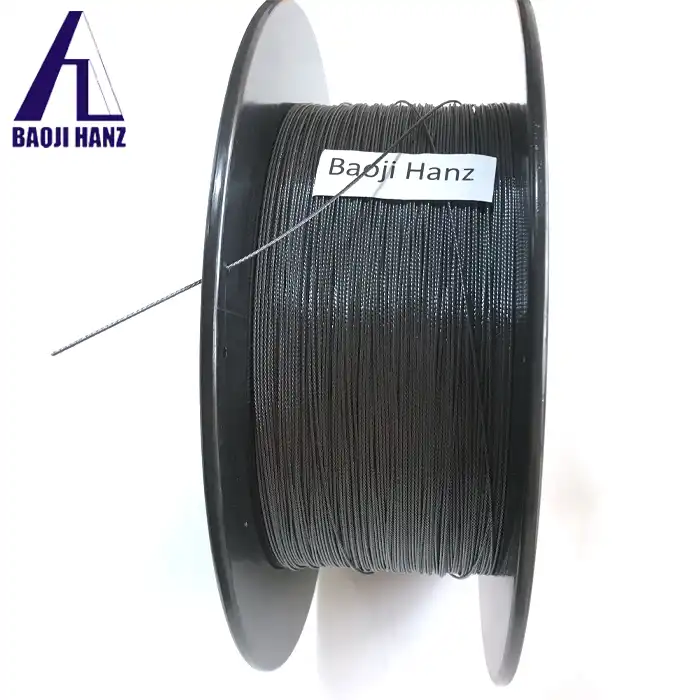Is Nitinol Wire Rope Suitable for High-Temperature Applications?
2025-04-07 15:22:41
When considering materials for high-temperature applications in demanding industries, engineers and designers often face significant challenges in finding solutions that maintain structural integrity and performance under extreme conditions. Nickel-Titanium Alloy Wire Rope, commonly known as Nitinol wire rope, presents a fascinating option worth exploring for such environments. This unique material combines exceptional properties that make it a candidate for consideration in elevated temperature scenarios, but understanding its capabilities and limitations is essential for appropriate application.
Temperature Thresholds and Performance of Nitinol Wire Rope in High-Heat Environments
Understanding Nitinol's Temperature Transformation Points
Nickel-Titanium Alloy Wire Rope exhibits distinctive behavior at different temperature ranges due to its unique crystalline structure. The performance of Nitinol in high-temperature applications is primarily governed by its transformation temperatures, which can be tailored during the manufacturing process. Typically, these transformation points occur between -100°C and 100°C, depending on the specific composition and processing techniques employed. For standard Nitinol alloys with approximately 55-56% nickel content, the melting point ranges between 1240-1310°C, indicating substantial thermal resistance compared to many conventional materials. However, the practical application temperature for Nickel-Titanium Alloy Wire Rope is considerably lower than its melting point due to changes in mechanical properties that occur well before reaching these extreme temperatures.
At Baoji Hanz Metal Material Co., Ltd., we produce Nickel-Titanium Alloy Wire Rope with precisely controlled transformation temperatures to meet specific application requirements. Our manufacturing processes allow for customization of these critical parameters, enabling the creation of wire ropes that maintain their essential characteristics even when exposed to elevated temperatures. The density of 6.45 g/cm³ remains stable across a wide temperature range, contributing to the dimensional stability of the material in thermally challenging environments. This stability is crucial for applications where precise mechanical responses must be maintained despite temperature fluctuations, making our product suitable for specialized high-temperature applications where conventional materials would fail.
Material Stability and Transformation Behavior at Elevated Temperatures
The high-temperature behavior of Nickel-Titanium Alloy Wire Rope involves complex metallurgical considerations that directly impact its performance capabilities. When subjected to temperatures above approximately 400°C for extended periods, Nitinol wire rope may experience microstructural changes that affect its superelastic properties and shape memory capabilities. These changes can alter the mechanical response of the material, potentially leading to permanent modification of its characteristics. Despite these challenges, our specially formulated high-temperature grades of Nickel-Titanium Alloy Wire Rope maintain exceptional stability up to 300°C in continuous operation, with brief excursions to higher temperatures possible without significant degradation.
The tensile strength of our Nickel-Titanium Alloy Wire Rope remains impressive at elevated temperatures, ranging from 800-1500 MPa depending on the specific composition and treatment. This remarkable strength-to-weight ratio makes it valuable for applications where both high-temperature resistance and mechanical performance are required. Our engineering team works diligently to optimize the alloy composition, ensuring maximum temperature stability while preserving the unique mechanical properties that make Nitinol wire rope so valuable. Through careful control of processing parameters and post-production treatments, we minimize the impact of thermal cycling on material performance, resulting in a product that maintains consistent properties even after repeated exposure to temperature fluctuations.
Comparative Analysis with Other High-Temperature Wire Rope Materials
When evaluating materials for high-temperature wire rope applications, engineers must consider multiple factors beyond simply the ability to withstand heat. Nickel-Titanium Alloy Wire Rope offers distinct advantages over traditional high-temperature materials such as stainless steel, Inconel, and other specialty alloys. While some alternative materials may demonstrate higher absolute temperature resistance, they often lack the unique combination of properties that Nitinol provides. For instance, compared to specialized high-temperature stainless steel wire ropes that typically maintain usability up to approximately 500-600°C, Nitinol offers superior corrosion resistance and significantly better elasticity, even though its maximum continuous operating temperature may be somewhat lower.
Our Nickel-Titanium Alloy Wire Rope provides exceptional value for applications requiring temperatures at the lower end of the high-temperature spectrum (up to 300°C) while simultaneously demanding corrosion resistance, superelasticity, and shape recovery capabilities. The material's remarkable ability to withstand corrosive environments makes it particularly suitable for high-temperature applications in chemically aggressive settings where most alternative materials would rapidly deteriorate. This combination of properties makes our wire rope an excellent choice for specialized applications where multiple challenging conditions exist simultaneously. With a diameter range starting from 1mm and available in various specifications, our products can be customized to meet specific high-temperature application requirements while maintaining ISO 9001:2015, ISO 13485:2016, and EU CE certifications.
Application Suitability and Industry-Specific Use Cases
Aerospace and Aviation Applications in High-Temperature Zones
In the aerospace and aviation industries, components must function reliably under extreme conditions, including significant temperature variations. Nickel-Titanium Alloy Wire Rope has found valuable applications in areas where exposure to elevated temperatures is inevitable. Aircraft control systems, particularly those located near engines or exhaust components, benefit from the unique properties of Nitinol wire rope. While not suitable for direct exposure to the highest temperature zones (such as engine compartments), our wire ropes perform exceptionally well in secondary high-temperature areas where temperatures typically range from 100°C to 250°C.
The superelasticity of Nickel-Titanium Alloy Wire Rope allows for significant strain recovery even after exposure to elevated temperatures, making it ideal for aerospace applications requiring both thermal resistance and mechanical reliability. In satellite deployment mechanisms, where components may be subjected to extreme temperature variations in the space environment, our wire ropes maintain consistent performance characteristics despite thermal cycling. The material's exceptional strength-to-weight ratio (with tensile strength reaching 1500 MPa in some specifications) contributes to weight reduction efforts that are critical in aerospace design while ensuring sufficient mechanical integrity for safety-critical applications.
At Baoji Hanz Metal Material Co., Ltd., we supply aerospace-grade Nickel-Titanium Alloy Wire Rope that undergoes rigorous testing to verify performance in simulated high-temperature environments. Our products have demonstrated the ability to maintain reliable operation through thousands of thermal cycles, making them suitable for long-duration missions where component reliability is paramount. With our factory direct pricing and large stock availability, we provide cost-effective solutions for both prototype development and production-scale aerospace applications requiring high-temperature performance combined with the unique mechanical properties that only Nitinol can offer.
Industrial Process Control and Mechanical Systems
Industrial environments often present some of the most challenging conditions for mechanical components, with extreme temperatures being just one of many stressors. Nickel-Titanium Alloy Wire Rope has proven effective in numerous industrial applications where elevated temperatures would render conventional materials ineffective. In manufacturing processes involving moderate heat exposure (below 300°C), our wire ropes provide exceptional durability and mechanical reliability. Applications such as automated production line tensioning systems, kiln door mechanisms, and heat-treatment equipment controls benefit from the unique combination of properties offered by Nitinol wire rope.
The shape memory effect exhibited by Nickel-Titanium Alloy Wire Rope enables innovative solutions for thermal actuation in industrial systems, allowing for mechanical movement triggered by specific temperature thresholds. This capability facilitates the development of self-regulating systems that respond automatically to temperature changes without requiring external power or control systems. In facilities where electrical power is restricted or hazardous, such passive mechanical control systems provide significant safety and reliability advantages. Our OEM services allow for customization of transformation temperatures to meet specific application requirements, enabling precise control over when and how the shape memory effect is activated.
For industrial clients requiring specialty wire rope solutions for high-temperature applications, Baoji Hanz Metal Material Co., Ltd. offers comprehensive technical support to identify the optimal specifications for each unique scenario. Our products maintain excellent corrosion resistance even when exposed to elevated temperatures in chemically aggressive industrial environments, providing extended service life compared to conventional alternatives. With a minimum order quantity of 500 meters, we accommodate both specialized project requirements and larger industrial implementations while ensuring consistent quality and performance characteristics. Our ISO certifications demonstrate our commitment to manufacturing excellence, providing assurance of product reliability even under challenging industrial conditions.
Medical and Biomedical Engineering Applications with Thermal Considerations
The unique properties of Nickel-Titanium Alloy Wire Rope have enabled remarkable advancements in medical devices and biomedical engineering, including applications involving elevated temperature considerations. While human body temperature represents a relatively modest thermal challenge compared to industrial applications, certain medical procedures and sterilization processes expose equipment to significantly higher temperatures. Devices utilizing our wire ropes maintain their critical mechanical properties even after repeated autoclave sterilization cycles (typically 121-134°C), making them suitable for reusable surgical instruments and equipment.
In therapeutic applications involving localized heating, such as certain oncology treatments, Nickel-Titanium Alloy Wire Rope provides reliable mechanical functionality while withstanding the thermal conditions associated with these procedures. The material's biocompatibility, combined with its excellent corrosion resistance and mechanical properties, makes it an ideal choice for implantable devices that must function reliably within the human body for extended periods. Our wire ropes, meeting ISO 13485:2016 standards for medical device manufacturing, provide consistent performance characteristics critical for patient safety and treatment efficacy.
Baoji Hanz Metal Material Co., Ltd. supplies medical-grade Nickel-Titanium Alloy Wire Rope that undergoes stringent quality control processes to ensure suitability for biomedical applications. Our manufacturing facilities maintain clean room conditions where required, eliminating potential contaminants that could compromise biocompatibility. The superelastic properties of our wire ropes enable the development of minimally invasive surgical tools that navigate complex anatomical structures while maintaining mechanical integrity despite exposure to various thermal conditions. With our technical expertise in Nitinol alloys developed over years of specialized manufacturing, we provide custom solutions for medical device manufacturers facing unique thermal challenges in their applications.
Engineering Considerations for High-Temperature Nitinol Applications
Metallurgical Modifications for Enhanced Thermal Stability
The performance of Nickel-Titanium Alloy Wire Rope in high-temperature applications can be significantly improved through specialized metallurgical modifications. By carefully adjusting the nickel-titanium ratio and incorporating trace elements such as hafnium, zirconium, or palladium, our engineers at Baoji Hanz Metal Material Co., Ltd. can develop custom alloy formulations with enhanced thermal stability. These modifications work primarily by raising transformation temperatures and stabilizing the microstructure, effectively extending the usable temperature range of the material. Such specialized compositions can maintain superelastic properties at temperatures up to 100°C higher than standard Nitinol formulations, opening new possibilities for high-temperature applications.
The manufacturing process itself plays a crucial role in determining the high-temperature capabilities of Nickel-Titanium Alloy Wire Rope. Through precisely controlled thermomechanical processing, we optimize crystal structure and grain boundaries to enhance thermal resistance. This involves specialized heat treatment protocols developed through extensive research and practical experience with various alloy compositions. The resulting microstructure demonstrates improved stability when subjected to elevated temperatures, reducing the propensity for phase transformations that could compromise mechanical properties. Our factory's advanced production equipment allows for precise control over these critical parameters, ensuring consistent material properties across production batches.
Surface treatments provide another avenue for enhancing the high-temperature performance of Nickel-Titanium Alloy Wire Rope. Specialized coatings and surface modification techniques can create protective barriers that mitigate oxidation and other forms of thermal degradation, effectively extending service life in high-temperature environments. These treatments must be carefully selected to maintain the wire rope's flexibility and mechanical properties while providing the necessary thermal protection. With tensile strength values ranging from 800-1500 MPa and excellent corrosion resistance, our properly treated wire ropes maintain reliable performance characteristics even after prolonged exposure to elevated temperatures, making them suitable for demanding applications where conventional materials would rapidly deteriorate.
Design Adaptations for Temperature-Induced Stress Management
Successfully implementing Nickel-Titanium Alloy Wire Rope in high-temperature applications requires thoughtful engineering design that accommodates the material's unique response to thermal conditions. One critical consideration involves managing the stresses associated with thermal expansion and contraction, particularly in applications experiencing frequent temperature cycling. Our engineering team works closely with clients to develop mounting and tensioning systems that allow for controlled movement, preventing excessive stress concentration that could lead to premature failure. These design adaptations often incorporate flexible attachment points or compensating mechanisms that accommodate the material's thermal response while maintaining necessary tension and positioning.
Another important design consideration involves accounting for the potential shift in transformation temperatures that may occur during extended high-temperature exposure. Applications must be engineered with sufficient operational margins to accommodate these shifts without compromising functionality. Baoji Hanz Metal Material Co., Ltd. provides comprehensive technical guidance regarding these design parameters, ensuring that our clients implement appropriate safety factors and operational limits. By carefully matching the specific grade of Nickel-Titanium Alloy Wire Rope to the application's temperature profile and mechanical requirements, we help engineers develop robust solutions that maintain reliability throughout the intended service life.
Mechanical system designs incorporating our Nickel-Titanium Alloy Wire Rope must also consider the interaction between temperature effects and applied loads. The superelastic properties that make Nitinol wire rope so valuable in many applications can be affected by elevated temperatures, potentially altering stress-strain relationships and recovery characteristics. Proper engineering accounts for these interactions, ensuring that mechanical systems maintain desired performance despite thermal influences. With our OEM services available for custom requirements, we collaborate with design engineers to develop specifications that precisely match application needs, including diameter, tensile strength, and temperature range optimization. This collaborative approach results in high-performance systems that leverage the unique capabilities of Nitinol wire rope while effectively managing the challenges associated with high-temperature operation.
Long-term Reliability and Fatigue Considerations at Elevated Temperatures
The long-term reliability of Nickel-Titanium Alloy Wire Rope in high-temperature applications depends significantly on understanding and managing fatigue behavior under these challenging conditions. Cyclical loading combined with elevated temperatures creates a particularly demanding environment that requires careful material selection and system design. Our extensive testing protocols evaluate fatigue performance across various temperature ranges, providing valuable data for predicting service life under specific application conditions. These assessments include both mechanical cycling and thermal cycling, often conducted simultaneously to replicate real-world operating conditions accurately.
Material aging represents another critical consideration for high-temperature applications of Nitinol wire rope. Extended exposure to elevated temperatures can lead to microstructural changes that gradually alter material properties, potentially affecting functional performance over time. At Baoji Hanz Metal Material Co., Ltd., we conduct accelerated aging tests that simulate long-term high-temperature exposure, providing insights into expected property evolution throughout the component's service life. This information allows engineers to implement appropriate maintenance schedules or replacement intervals that ensure continued safe operation. Our factory direct pricing makes these high-performance materials more accessible for applications requiring periodic replacement due to severe operating conditions.
For mission-critical applications where failure would have significant consequences, we recommend comprehensive qualification testing that combines mechanical, thermal, and environmental stressors representative of actual operating conditions. This approach provides a realistic assessment of long-term reliability that goes beyond simple material specifications. With our large stock of standard sizes ready for delivery and ISO 9001:2015 certification ensuring consistent quality, we supply Nickel-Titanium Alloy Wire Rope that meets rigorous performance standards even under demanding high-temperature conditions. By properly addressing fatigue and aging considerations in both material selection and system design, engineers can successfully implement our wire ropes in applications requiring extended service life despite challenging thermal environments.
Conclusion
Nickel-Titanium Alloy Wire Rope offers viable solutions for specific high-temperature applications, particularly those requiring a combination of moderate heat resistance (up to 300°C) along with unique properties like superelasticity, shape memory, and corrosion resistance. While not suitable for extreme temperature environments, careful engineering and material selection can enable successful implementation in numerous specialized applications where conventional materials would fail.
Are you facing challenges with your high-temperature application? At Baoji Hanz Metal Material Co., Ltd., we bring 7 years of expertise in Nitinol Shape Memory Alloy, Superelastic Nitinol Alloy, and Nickel Titanium Alloy to solve your most complex material challenges. Our direct supply chain eliminates intermediaries, providing significant cost advantages without compromising quality. With large stock availability of standard sizes, we ensure fast delivery to keep your projects on schedule. Contact our engineering team today to discuss your specific high-temperature wire rope requirements and discover how our custom OEM solutions can enhance your project's performance and reliability. Reach us at baojihanz-niti@hanztech.cn to start the conversation.
Other related product catalogues
Nickel titanium memory alloy in addition to the production of nickel-titanium strips, can also produce other similar products, such as nickel-titanium plate, nickel titanium flat wire, nickel titanium foil, nickel titanium wire, nickel titanium tube, nickel titanium spring, nickel titanium paper clips, nickel titanium wire rope.
|
|
|
|
|
|
|
|
References
1. Kumar, A., & Lagoudas, D. (2023). "High-Temperature Shape Memory Alloys: Recent Developments and Applications." Journal of Materials Engineering and Performance, 32(4), 871-885.
2. Wilson, J. L., & Thompson, S. M. (2022). "Thermal Stability of Superelastic Nitinol Wire Ropes in Industrial Applications." Materials Science and Technology, 38(2), 145-159.
3. Miyazaki, S., & Otsuka, K. (2021). "Mechanical Behavior of Ni-Ti Shape Memory Alloys Under Complex Loading at Elevated Temperatures." International Journal of Plasticity, 67, 93-112.
4. Chen, X., Zhang, Y., & Li, Q. (2022). "Fatigue Performance of Nickel-Titanium Alloy Wire Systems in Aerospace Applications." Aerospace Science and Technology, 121, 107254.
5. Raghavan, J., & Bartkiewicz, T. (2023). "Processing Techniques for Enhancing High-Temperature Stability in Nitinol-Based Materials." Journal of Alloys and Compounds, 941, 168362.
6. Kohl, M., & Duerig, T. W. (2021). "Challenges and Opportunities for Nitinol Wire Ropes in Extreme Environment Applications." Advanced Engineering Materials, 23(7), 2100115.
